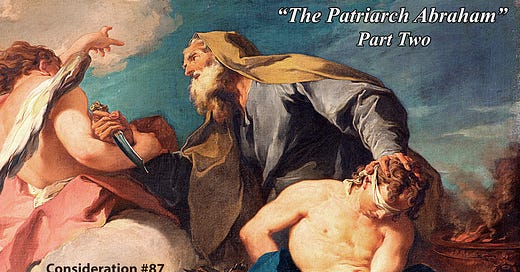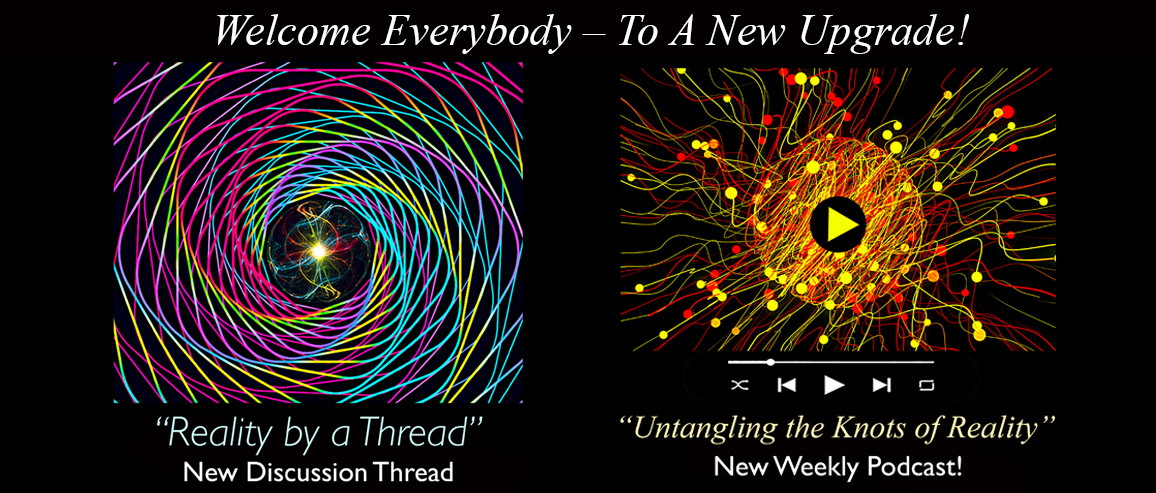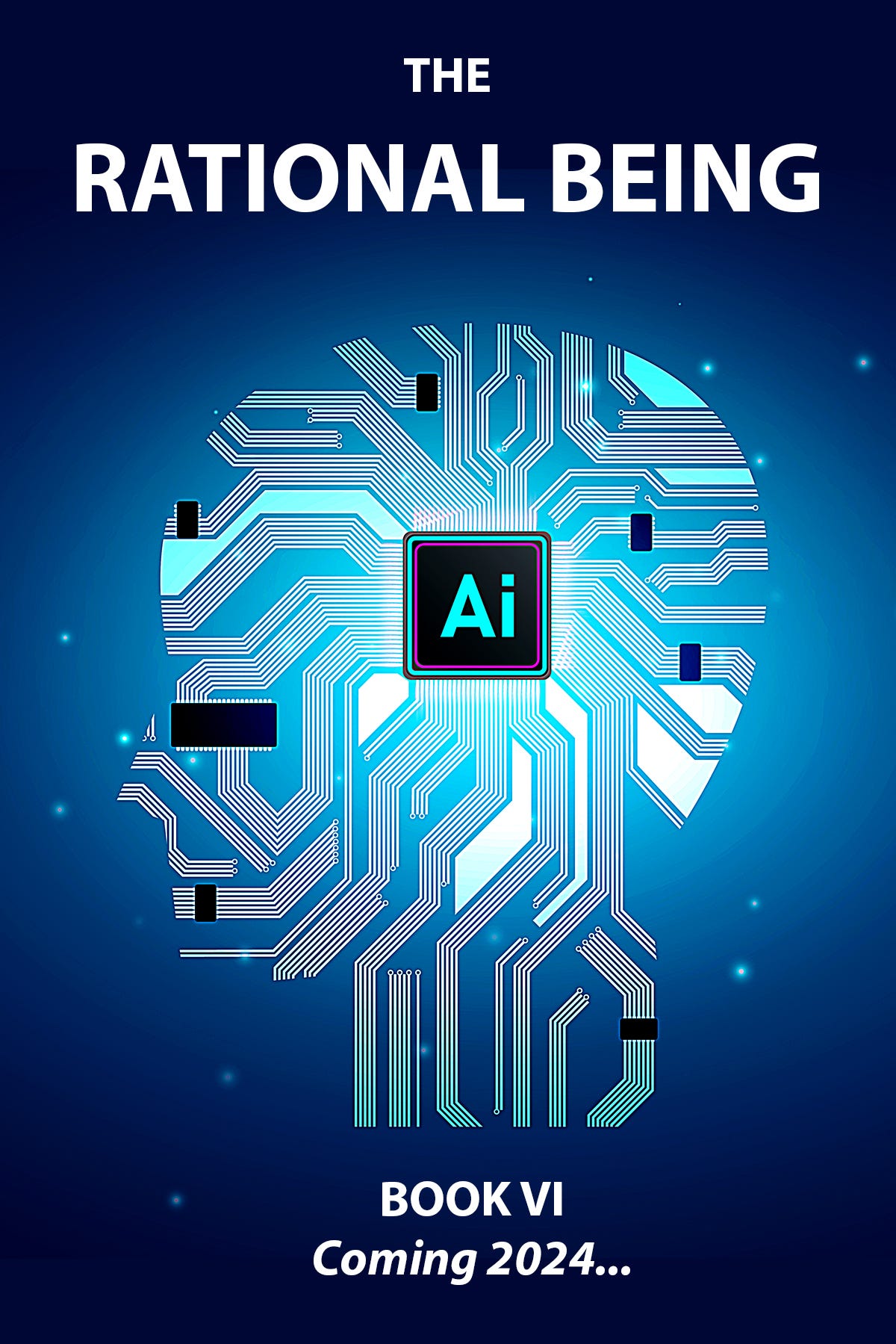How Things Work: A Brief History of Reality
BOOK II: The Power of Three (Science & Religion) – Consideration #87. "The Patriarch Abraham" (Part Two)
Be a part of the Conversation!
Tuesday June 13, 2023
“Maybe God is only the most powerful poetic idea we humans're capable of thinkin'… Maybe God has no reality outside our minds and exists only in the paradox of Perfect Compassion and Perfect Justice. Or maybe… God is exactly as advertised in the Torah. Maybe, along with all its other truths and beauties, Judaism preserves for each generation of us the reality of the God of Abraham, of Isaac, of Jacob, of Moses - the God of Jesus... A cranky, uncanny God… A God with quirky, unfathomable rules, a God who gets fed up with us and pissed off! But quick to forgive…"
– Mary Doria Russell
PREFACE
Welcome Everybody!
In the Biblical narrative, the Abraham story marks a willingness for God to re-engage and interact directly with human beings again after destroying them in the Great Flood because of their wickedness. It sets up a paradigm where faith and obedience to God results in great reward. It confirms that God keeps commitments and promises. It also establishes that working with God is often difficult and challenging. In addition, God chooses, and uses, individuals for His own purposes. It eventually evolves into a “faith” that the universe is a “rational” universe because God is a “rational” God, the original premise of empirical science.
“Theologically, this story sets up the possibility for a personal relationship with God.”
In this story, God’s relationship with Abraham represents His willingness to have a personal relationship with human beings again; Abraham becomes the mechanism through which virtually all human beings (more than the stars in the heaven) will eventually be a part of God’s salvation. Theologically, this story sets up the possibility for a personal relationship with God. This is only possible because Abraham's God is a living God.
Typical pagan religions at the time worshiped multiple “gods” who were represented physically in the empirical world as “idols,” or “engraved images” in wood and stone; consider the traditions of both the Greek and Roman pantheon of gods. Abraham, establishes monotheism, a belief in “one” unified consciousness responsible for creating and maintaining the entire universe through His Natural Laws. However, unlike Aristotle, who believed this consciousness which he called the “Unmoved Mover” did not actively participate in the “daily affairs” of human beings, Abraham actively engaged with a consciousness that Enlightenment philosophers and the original founders of the United States often referred to as “Providence.”
“The universe, or empirical reality, was a direct reflection of God operating in the universe through what we experience as ‘Natural Law.’”
Not only did Abraham’s God directly interact in human affairs, but the entire purpose of the universe was so that God could interact in human affairs. Or perhaps more accurately, so that human beings could interact with God. Unlike the stone statues of Zeus, Poseidon, and Athena, Abraham’s God was Eternally Present and “alive” in the very manifestation of the universe, or reality, itself. The universe, or empirical reality, was a direct reflection of God operating in the universe through what we experience as “Natural Law.” Human beings and God have a “symbiotic relationship” in terms of manifesting the “experience” we call empirical reality.
“We tend to think of ‘eternity’ as an abstract illusion, however, Einstein considered ‘time’ to be the abstract illusion.”
As we will consider in Book III, this concept seems to connect with many of the rational implications of Quantum Mechanics and String Theory. One key consideration is related to “time” and the concept of “eternity,” which is only a consideration “within time.” We tend to think of “eternity” as an abstract illusion, however, Einstein considered “time” to be the abstract illusion. If time is the illusion, it changes our consideration of concepts such as “eternity.”
If the consciousness commonly referred to as “God” is “eternally present,” is it not also essentially “eternally alive?” Abraham claimed to have had access to, and actively interact with, this eternally present consciousness, which he called God. Essentially making Abraham the first recorded rationalist in the Bible.
CONSIDERATION #87 – “The Patriarch Abraham” (Part Two)
There is perhaps no Biblical narrative more terrifying to children than the story of Abraham almost sacrificing his son, Isaac. The very thought that your parent might kill you because God told them to, is a horrific possibility for a child. Many point to this story as evidence of the psychosis related to religion itself. On its face, this story seems absurd and depraved. However, within the context of the entire narrative, there is a natural, and theological, purpose to it. So, what is the answer as to why God commanded Abraham to sacrifice his son?
Let’s begin by considering the narrative: (Genesis 22:1-2)
Some time later God tested Abraham. He said to him, “Abraham!”
“Here I am,” he replied.
Then God said, “Take your son, your only son, whom you love—Isaac—and go to the region of Moriah. Sacrifice him there as a burnt offering on a mountain I will show you.”
The narrative directly states that God is “testing” Abraham. So, the first question becomes, why does God want to test Abraham? The short answer is that God doesn’t trust human beings anymore. Once Adam and Eve enter the world of duality, God’s relationship with human beings becomes extremely problematic. At this point, God is looking for proof that Abraham is the one capable of moving to the next step in His plan for a renewed relationship with human beings. Human beings, through Abraham, would have to COMPLETELY trust God BEFORE God would be willing to trust them again. Abraham would have to be willing to “sacrifice” everything as proof of not only his faith in God; but more importantly, his trust in God.
Later, in the New Testament, God would have to be willing to sacrifice everything as proof of His faith and trust in “mankind.”
(Genesis 22:6-12)
Abraham took the wood for the burnt offering and placed it on his son Isaac, and he himself carried the fire and the knife. As the two of them went on together, Isaac spoke up and said to his father Abraham, “Father?”
“Yes, my son?” Abraham replied.
“The fire and wood are here,” Isaac said, “but where is the lamb for the burnt offering?”
Abraham answered, “God himself will provide the lamb for the burnt offering, my son.” And the two of them went on together.
When they reached the place God had told him about, Abraham built an altar there and arranged the wood on it. He bound his son Isaac and laid him on the altar, on top of the wood. Then he reached out his hand and took the knife to slay his son. But the angel of the Lord called out to him from heaven, “Abraham! Abraham!”
“Here I am,” he replied.
“Do not lay a hand on the boy,” he said. “Do not do anything to him. Now I know that you fear God, because you have not withheld from me your son, your only son.”
The second question is why would Abraham even consider doing what God asked him to do? Outside of the Biblical Narrative this is an obvious question. However, within the context of the narrative it is not as illogical as it first appears. God had previously made multiple promises to Abraham that although appearing impossible at the time were manifested into reality.
This wasn’t Abraham’s first experience with God. God had already revealed himself to Abraham many times through Abraham’s successes and failures. Abraham knew the character of God. Once, he even asked God, “Will not the judge of all the earth do right?” (Gen. 18:25)
After this encounter, perhaps Abraham settled this question in his mind once and for all.
Abraham obeyed God’s unexpected command because he trusted God’s promise and knew him to be good and trustworthy.
– Andy Patton – Why Did God Ask Abraham to Sacrifice Isaac?
God had made a promise, a divine commitment, that Abraham would be eternally manifested through the descendents of his son, Isaac. Abraham trusted that commitment, as he had with previous commitments that were proven true. Therefore, there was no doubt in his mind that Isaac would somehow live to fulfill God’s commitment and covenant to him. He had complete “faith” that God would honor his promise, and therefore Isaac would, in fact, have to live to fulfil this commitment.
At some level, Abraham did not believe he could “kill” Isaac and end the possibility of the covenant becoming physically manifested in the empirical world. This is directly indicated in the text.
Abraham didn’t think Isaac would die. When they reached the mountain, Abraham told his servant, “Stay here with the donkey; I and the boy will go over there and worship and come again to you” (GENESIS 22:5)
Notice how the text includes both Abraham and “the boy,” Isaac, in the return journey.
And consider Isaac’s question about where the lamb for the sacrifice would come from. Abraham responds, “God himself will provide the lamb” (Gen. 22:8).
It seems Abraham prepared himself to do what God asked, but he expected something else to happen.
The author of the book of Hebrews gives us insight to Abraham’s thoughts. “He considered that God was able even to raise [Isaac] from the dead” (Heb. 11:19a)
Andy Patton – Why Did God Ask Abraham to Sacrifice Isaac?
In addition, Abraham is the first “prophet” in a long line of Biblical prophets. In the Bible, particularly the Old Testament, God uses prophets to “foreshadow” future divine occurrences in the empirical world. In this sense, Abraham is “modeling” the future actions of God.
“This was a prophetic reenactment.
The story of Abraham and Isaac takes on a larger significance when you place it in the context of prophetic reenactment. Throughout the Bible, God asked prophets to act out things that he said he would do.
The acts themselves are a lot less strange when we see them in this light. Then we start asking different questions.
When we read Genesis 22, we may think: How could God have required this? But when we view the story through the lens of prophetic reenactment, we can instead ask: What did God intend for us to learn through this?”
Andy Patton – Why Did God Ask Abraham to Sacrifice Isaac?
Combining the Old and New Testament into one large narrative adds another dimension of theological interpretation to the Abraham story; it foreshadows the sacrifice of God’s “only” son, Jesus.
“Both Isaac and Jesus are long-awaited ‘beloved sons’ who are born in miraculous circumstances.
Both sons carry the wood that is to be the instrument of their deaths on their backs. In both stories, the father leads the son up a mountain, and the son follows obediently toward his own death. And in both scenarios, God provides the sacrificial substitute, which Abraham says will be a ram (a male lamb) and the New Testament authors identify as Jesus, ‘the lamb of God.’”
Andy Patton – Why Did God Ask Abraham to Sacrifice Isaac?
Therefore, Abraham’s demonstration of faith and trust in God serves as the foundation of both Judaism and Christianity. It cements the covenant between Abraham and God which is ultimately manifested through Isaac, the son of Abraham, and Jesus, the son of God. Symbolically, it demonstrates the importance of the relationship between God and Mankind through the sacrifice that both are willing to make in order to re-establish that relationship. Ultimately, the Abraham story reflects the first step in a recommitment of trust and faith between God and Mankind.
(Genesis 22:15-18)
The angel of the Lord called to Abraham from heaven a second time and said, “I swear by myself, declares the Lord, that because you have done this and have not withheld your son, your only son, I will surely bless you and make your descendants as numerous as the stars in the sky and as the sand on the seashore. Your descendants will take possession of the cities of their enemies, and through your offspring all nations on earth will be blessed, because you have obeyed me.”
Andy Patton – Why Did God Ask Abraham to Sacrifice Isaac?
Another consideration of this story is that it directly connects to the Old Testament promise of a “Messiah,” which Christians believe to be Jesus. In the New Testament, the story of Abraham and Isaac serves as a metaphor which foreshadows the story of Jesus and his “Father,” God.
“What do all these parallels mean? Abraham and Isaac point beyond themselves to the Messiah. This story is a prophetic reenactment of the greater redemption God would someday accomplish through one of their descendants, Jesus.”
Andy Patton – Why Did God Ask Abraham to Sacrifice Isaac?
In the end, God never intended for Abraham to kill his son, Isaac. It was a test of trust and faith; for both human beings, and, ultimately, for God as well.
POSTSCRIPT
It is important to note that God did not offer, or mention, “heaven,” or the afterlife, as part of His covenant with Abraham. Abraham does not make the covenant with God so that he can “go to heaven,” or “live forever;” he makes the covenant for his descendents and to become a righteous man under God. Essentially, Judaism is concerned with living a good, or righteous, life here on Earth. Doing “the right thing” doesn’t get you into heaven; it keeps you in God’s grace during your life on earth and propagates blessings to your descendants. Heaven becomes more of a theological factor in The New Testament.
“He offers Abraham the most ‘physically binding’ contract that can be made: a long and substantial line of influential decedents.”
The Old Testament represents a very empirical interpretation of God and His Influence in the physical world. God makes absolutely no “metaphysical” promises to Abraham in the Bible. Instead, He offers Abraham the most “physically binding” contract that can be made: a long and substantial line of influential decedents. Decedents, that will alter the experience of empirical reality through the spiritual traditions of Judaism, Christianity, and Islam.
There is, perhaps, no greater example of how a rational, or spiritual, interpretation of reality can have such a direct impact on the empirical, or physical world; than the story of Abraham. In the temporal empirical world of physical reality it has been used, and abused, by human beings for both good and evil; introducing a duality of positive and negative manifestations into our understanding of reality. Ironically, the essence of the story is ultimately one of “unity.”
“…this covenant represents the beginning of Jewish history, as well as Christian and Muslim history.”
Although the stories of the Garden of Eden and Noah and the Great Flood precede the covenant between God and Abraham, this covenant represents the beginning of Jewish history, as well as Christian and Muslim history. Judaism, Islam, and Christianity all claim some kind of lineage from Abraham and consider him to be the original patriarch of their religion. Everything else that happens in the Bible, narratively and theologically, is related to this covenant. It is the first of three key Biblical turning points.
Next week we begin to consider the second key turning point in the Biblical narrative: Mosses and The Law.
This Week on “The Thread”…
Expand the Conversation by Upgrading to “Reality by a Thread!”
Excerpt from Lesson Two: “Untangling Math & Language People” from the upcoming UDEMY Online Course “Untangling Eastern & Western Dualism” NOW PREVIEWING on “Reality by a Thread!”
•Untangling the Knots of Reality “UDEMY VIDEO PREVIEW: Lesson Two – "Untangling Math & Language People” (“What is the distinction between math and language? Do “math people” and “language people” interpret reality differently? How do myths and metaphors communicate the rational aspects of empirical reality? Why do religious texts, such as the Old Testament, incorporate such empirical narratives? These are some of the knots we will attempt to untangle in this week’s FREE UDEMY VIDEO COURSE PREVIEW! (For Reality by a Thread Subscribers) That’s a lot of math and language for one video lesson!!
• “Reality by a Thread” Discussion Thread: The Quantum Paradox: Part 5 – “The Wavelength of Reality” (“Understanding how atoms share electrons in these states of Superposition is what allows us to develop semiconductor material such as silicon; combining these semiconductors in specific ways is what enables us to produce transistors on a very tiny scale with millions of transistors on a single chip. Those chips, and their spread-out “shared” electrons, are what make the current digital revolution, including Artificial Intelligence, possible...”)
•FREE PDF Download of Book IV: “The Cosmic Symphony – Overtones of String Theory” plus other Free Books, Discounts and Benefits. Also Gain Complete Access to all Previous Podcasts and Threads!
UPGRADE NOW!






